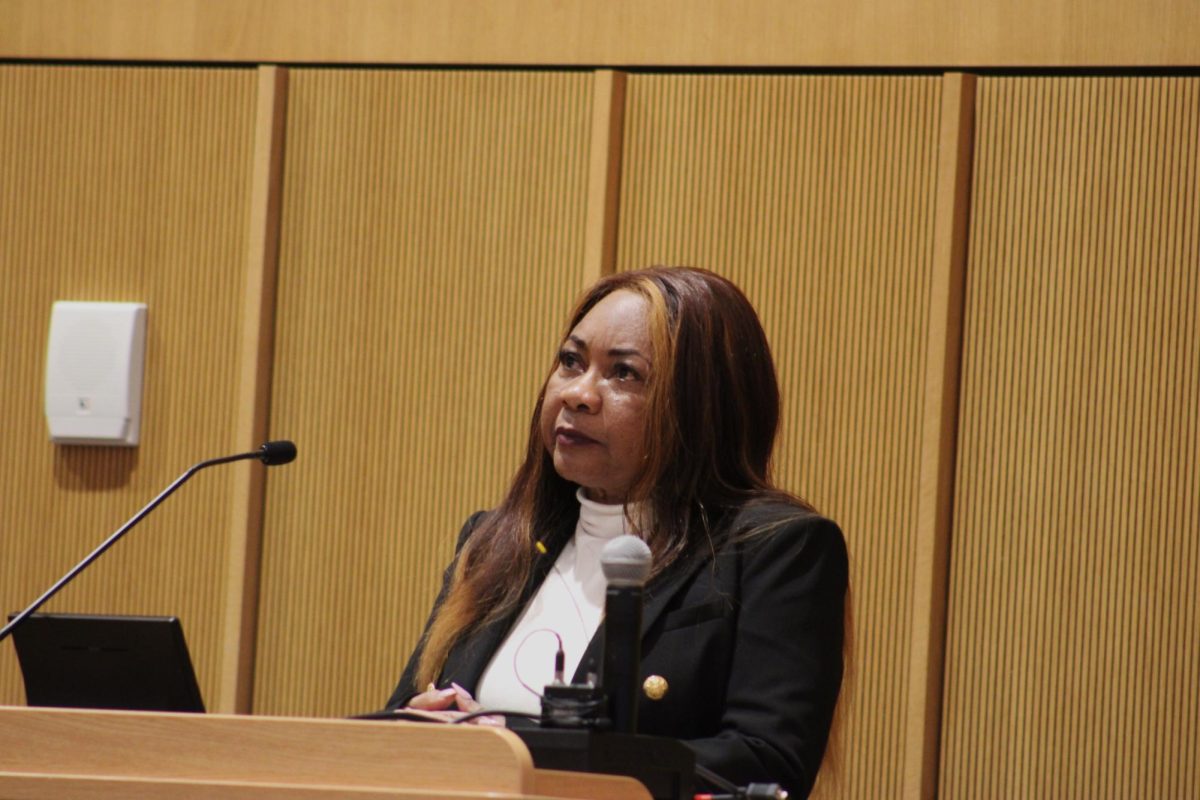American environmentalist Catherine Coleman Flowers came to speak at the University of Massachusetts Amherst on Feb. 29 to discuss systemic racism, climate injustice and the inadequate waste and water infrastructure in the U.S., especially in the rural south.
Flowers is author of the book “Waste: One Woman’s Fight Against America’s Dirty Secret,” which chronicles her journey to bring economic justice to the Black community of Lowndes County, Alabama who are victims of faulty septic systems. As a result, these communities suffer from tropical diseases that doctors in the U.S. often don’t know how to diagnose or treat. “Unjust as it may seem, it is not unusual for residents of poor marginalized communities to be forced to pay for infrastructure that doesn’t work,” Flowers writes in her book.
Flowers grew up in Alabama, with parents born in the aftermath of the Great Depression and the height of the Jim Crow era. Her family was used to living sustainably by reusing supplies like aluminum foil and growing their own food, such as peppers and other vegetables often in recycled mason jars. Her parents fostered a supportive environment and their home became a community hub.
“Anyone that had a problem came to [her parents],” Flowers said.
Flowers often sat with young activists at the dinner table while her mom cooked a meal for whomever walked through the door. As a result, Flowers became an activist herself and spent her high school and college years fighting for racial justice and equal access to education.
Flowers grew up constantly interacting with nature. She was given a lot of free reins so she took to wandering through nearby corn mazes, eating ripe corn straight from the stock and exploring forest lands.
“I didn’t realize that maybe that was helping me become an environmentalist,” Flowers said.
Lowndes County, Alabama, a place once was often referred to as “bloody Lowndes,” is known for its violently racist history. The repercussions of slavery, Flowers described, never eased in Lowndes County and the racist economic and social foundations directly affects the current sanitization infrastructure. The local population is not able to “flush and forget,” as she writes in her book.
“It’s a struggle sometimes living in a state that’s always trying to find the best way to kill people,” Flowers said. But regardless, Flowers keeps returning to fight for her community in Lowndes County and other victims of climate injustice.
Due to the rising water tables and sea level on Alabama’s coast, improperly built sewer systems fail easily and raw sewage often ends up flooding the backyards of Lowndes County residents, and results in illnesses. Diseases such as hookworm are present in the area, as Flowers discovered in a study. However, as Flowers discusses both in her book and her work every day as a climate justice advocate, these problems go ignored and unrecognized by government and legislation, despite the efforts of the local community to bring attention to their daily struggles.
What’s happening in Lowndes County is an example of what happens when systemic racism and the climate crisis intersect: marginalized communities face the most extreme consequences, Flowers explained.
“A lot of the people who are suffering from climate change in the Global South didn’t create the problems and they also don’t have the infrastructure to innovate out of it,” Flowers said.
Additionally, as Flowers points out, those marginalized communities which are carrying the burden of the climate crisis are also denied autonomy over creating solutions for change. Oftentimes what happens in places like Lowndes County is policy markers come in and force solutions that do not adequately address the concerns of the local population.
“Sometimes we get the [college] degree and we lose our common sense,” Flowers said. “It’s the people who have been sitting and watching for 30 years who are the experts … You need to work with local folk.”
About midway through the lecture, Flowers talked about a recent trip to Dubai, United Arab Emirates and expressed that she was impressed with the city’s infrastructure.
“What I saw in Dubai was what investment looks like,” Flowers said. “It’s like they threw away the templates and made something new.”
Flowers said she realized her “mind had been colonized,” after she began traveling to different countries and urged young people to travel to expose themselves to new ways of thinking. Flowers also said it’s important for young people to read and understand history since “we are going to have to innovate ourselves out of the problem [of the climate crisis].”
Flowers ended the lecture with advice for young people wanting to organize to make change: to live your life in such a way that benefits seven generations ahead of you.
“I think we shouldn’t give up hope until we stop breathing … because then we won’t do anything and the bad people will,” Flowers said.
Grace Lee can be reached at [email protected].




















